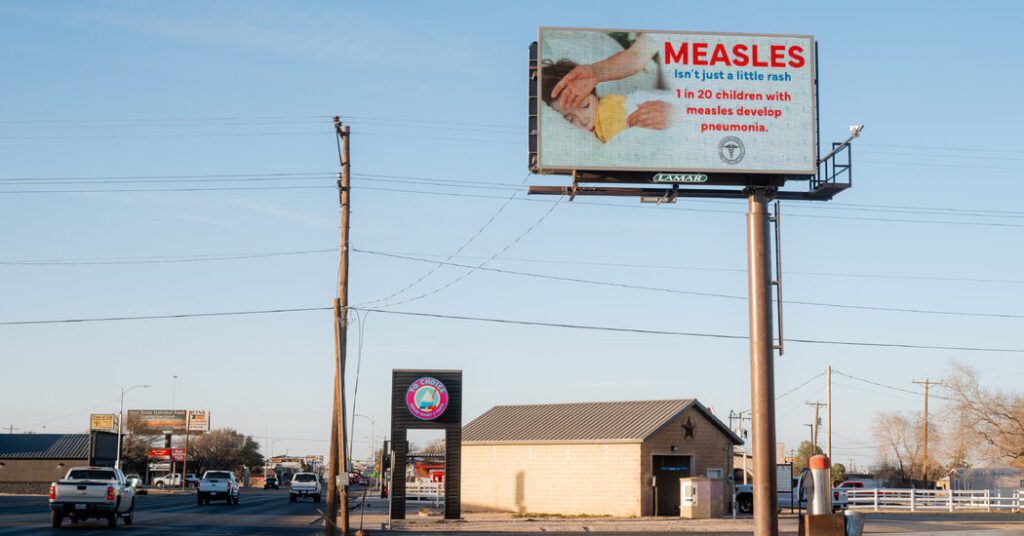Health Secretary Kennedy Jr. Responds to Measles Outbreak Tragedies
Fatal Case Highlights Public Health Concerns
On Sunday, Health Secretary Robert F. Kennedy Jr. attended the funeral of an 8-year-old girl who succumbed to measles during a significant outbreak affecting West Texas. This incident raises serious questions about his management of public health crises.
The tragic death, occurred early Thursday in Lubbock, Texas, marks only the second confirmed measles-related death in the United States in the past decade. According to reports from The New York Times, the child passed away due to “measles pulmonary failure” and was unvaccinated without any pre-existing health conditions.
The Outbreak and Its Ramifications
Mr. Kennedy expressed his sorrow for the loss, stating, “My intention was to come down here quietly to console the families and to be with the community in their moment of grief.” He emphasized the importance of vaccination, noting, “The most effective way to prevent the spread of measles is the M.M.R. vaccine.”
This recent outbreak in West Texas saw its first measles-related death in February, involving another unvaccinated child. Additionally, another unvaccinated individual who tested positive for measles died in New Mexico, though officials have yet to confirm a direct correlation to the disease.
Since the outbreak began in late January, West Texas has reported approximately 480 measles cases, with 56 hospitalizations. The spread of the virus has also reached neighboring states, impacting individuals in New Mexico and Oklahoma.
Threat to Public Health Achievement
The rapid expansion of the outbreak threatens the United States’ measles elimination status, a significant public health milestone achieved in 2000. Public health officials in West Texas predict that this situation may persist for up to a year if unchecked.
Criticism from the Antivaccination Community
In a controversial statement shortly after the child’s death, a representative from the antivaccine community accused the hospital of mismanaging the case. This follows previous claims by Children’s Health Defense, a group founded by Mr. Kennedy, alleging that medical errors contributed to earlier measles fatalities.
This assertion has drawn ire from health experts. Dr. Michael Osterholm, an epidemiologist from the University of Minnesota, stated emphatically, “These are not medical errors. This sits squarely on the back of antivaccine voices that have continued to spread disinformation.”
Expert Opinions on Preventive Measures
Mr. Kennedy’s apparent promotion of alternative treatments has been criticized for potentially delaying effective care, with experts claiming it could lead to dangerous health outcomes, including excessive vitamin A consumption.
“This is a tragedy, an absolutely needless death,” remarked Dr. Peter Marks, former top vaccine regulator, criticizing the federal response for failing to focus on vaccinations, the most effective prevention method.
Calls for Action from Health Officials
On the same day, Senator Bill Cassidy, a medical doctor and Republican from Louisiana, urged the public via social media to get vaccinated and stressed that health officials must advocate for vaccination more vigorously to prevent further tragedies.
The Contagious Nature of Measles
Measles is highly contagious, capable of remaining airborne for up to two hours after an infected person has left the area. The virus can spread through respiratory droplets when an infected individual coughs, breathes, or sneezes.
Initial symptoms typically occur one to two weeks after exposure, including high fever, cough, and runny nose, followed by a distinct rash. While most cases resolve within weeks, complications can arise, leading to severe health issues, including pneumonia and brain swelling.
The Centers for Disease Control and Prevention (CDC) estimates that one or two out of every 1,000 children infected with measles will die, highlighting the risks associated with this disease and the importance of vaccination to protect public health.


